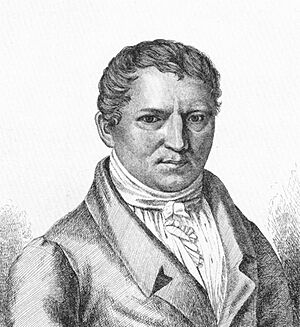Karl Friedrich Eichhorn facts for kids
Karl Friedrich Eichhorn (born 1781, died 1854) was an important German jurist. A jurist is someone who studies and understands law. He was known for his work on German law and history.
Contents
Early Life and Education
Karl Friedrich Eichhorn was born in Jena, Germany. His father was Johann Gottfried Eichhorn. Karl began his studies at the University of Göttingen in 1797. He was a very bright student.
A Career in Law and Teaching
In 1805, Karl Eichhorn became a professor of law at Frankfurt (Oder) University. He taught there until 1811. After that, he moved to the new Friedrich Wilhelm University in Berlin. There, he continued to teach law.
In 1813, when there was a call to arms, Eichhorn joined the military. He became a captain of horse. He received the Iron Cross award at the end of the war for his bravery.
After his military service, Eichhorn returned to teaching. In 1817, he became a law professor at the University of Göttingen. He was very successful there. However, he had to stop teaching in 1828 because of poor health.
In 1832, he returned to his teaching role in Berlin for two more years. He also worked for the ministry of foreign affairs. He served on many state committees. He also continued his important legal research and writing. He was also a member of the Prussian Supreme Tribunal, which was a high court. He worked until his death in Cologne.
Important Works and Ideas
Eichhorn was seen as a leading expert on German constitutional law. Constitutional law deals with the basic rules and laws of a country. His most important book was Deutsche Staats- und Rechtsgeschichte. This book was about the history of German government and law. It was published in several parts between 1808 and 1823.
He also helped start a legal journal called Zeitschrift für geschichtliche Rechtswissenschaft. He worked on this with Friedrich Carl von Savigny and Johann Friedrich Ludwig Göschen. Eichhorn also wrote other books. These included Einleitung in das deutsche Privatrecht (about German private law) and Grundsätze des Kirchenrechts (about church law).
Awards and Decorations
- Iron Cross of 1813
- Pour le Mérite for Arts and Sciences (1842)
- Order of the Red Eagle (Prussia, 1847)
- Maximilian Order for Science and Art (Bavaria, 1853)
See also
- German Historical School of Law
 | William L. Dawson |
 | W. E. B. Du Bois |
 | Harry Belafonte |


